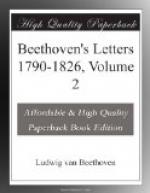Potter, Cipriani, pianist in London.
Prague.
Prince Regent, the, afterwards George IV. of England.
Probst, music publisher in Leipzig.
Prussia.
Punto (alias Stich) a celebrated horn player, to whom Beethoven was mainly indebted for his knowledge of that instrument (died 1804).
“Queen of the Night.” See Beethoven’s sister-in-law.
Radziwill, Prince, at Berlin, a devoted patron of music and the composer of music to “Faust.”
Rampel, Beethoven’s copyist about the year 1824.
Rasumowsky, Count, afterwards Prince, Russian ambassador at Vienna, an ardent lover of music.
Recke, Elise von der, the well-known poetess.
Reisser, vice-director of the Polytechnic Institution at Vienna, co-guardian of Beethoven’s nephew in the year 1825.
Religious and moral sentiments on particular subjects.
Rellstab, Ludwig, a writer and poet, for many years
editor of the
“Vossische Zeitung,” in Berlin.
Ries, Ferdinand, son of the preceding, a pupil of Beethoven and a distinguished composer. Quitted Vienna in 1805, and, with the exception of a short residence there, on his return from Russia in the autumn of 1808, never again returned to that capital (Schindler, i. 227).
Ries, Franz, Court musician to the Elector of Cologne,
a helpful friend to
Beethoven (born 1755).
Rochlitz, Friedrich, the well-known writer on the science of music, and for nearly twenty-five years editor of the Leipzig “Allgemeine Musikzeitung,” a man who, notwithstanding his entire lack of historical acumen and his limited acquaintance with the technicalities of music, did very much towards liberating the art from its mechanical condition, and promoting its intellectual appreciation by the public. He was in Vienna in the year 1822, where he became personally acquainted with Beethoven, but never fully appreciated the genius of the master,—a circumstance which Beethoven himself most deeply felt, even after the retirement of Rochlitz from the editorship of that journal, and which formed the subject of many ironical remarks on the part of Beethoven respecting these representatives of the so-called Old-German national composers.
Roeckel, singer of the part of Florestan in Vienna
in 1806, still living at
Bath, in England.
Rode, the celebrated violinist; came to Vienna in the winter of 1812-13, where he became acquainted with Beethoven.
Rudolph, Archduke, youngest brother of the Emperor Franz, born 1788, died 1831, a passionate lover of music, and himself a composer; he became Beethoven’s pupil in 1808, and in 1819 Cardinal-Archbishop of Olmuetz.
Russia.
Rzehatschek, in Vienna.
Salieri, Kapellmeister at Vienna, a contemporary and
rival of Haydn and
Mozart, for some time Beethoven’s instructor
in the dramatic style.




